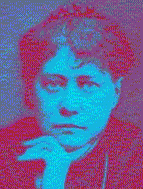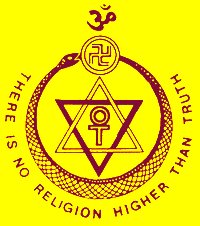The Key to Theosophy

Helena
Petrovna Blavatsky
1831
-1891
_______________________
The Key to Theosophy
By
Helena Petrovna Blavatsky
Theosophy and
The Theosophical Society
The Meaning of the Name
Q. Theosophy and its doctrines are often referred to as a
newfangled religion.
Is it a religion?
A. It is not. Theosophy is Divine Knowledge or Science.
Q. What is the real meaning of the term?
A. "Divine Wisdom," (Theosophia) or Wisdom of the gods,
as (theogonia),
genealogy of the gods. The word 'theos' means a god in Greek, one
of the divine beings, certainly not "God" in the sense attached in
our day to the term.
Therefore, it is not "Wisdom of God," as translated by
some, but Divine Wisdom such as that possessed by the gods. The term is many
thousand years old.
Q. What is the origin of the name?
A. It comes to us from the Alexandrian philosophers, called lovers
of truth,
Philaletheians, from (phil) "loving," and (aletheia)
"truth." The name Theosophy
dates from the third century of our era, and began with Ammonius
Saccas and his disciples, also called Analogeticists, who started the Eclectic
Theosophical
system.
As explained by Professor Wilder, they were called so because of
their practice
of interpreting all sacred legends and narratives, myths and
mysteries, by a
rule or principle of analogy and correspondence: so that events
which were
related as having occurred in the external world were regarded as
expressing
operations and experiences of the human soul. They were also
denominated
Neo-Platonists. Though Theosophy, or the Eclectic Theosophical
system, is
generally attributed to the third century, yet, if Diogenes
Laërtius is to be
credited, its origin is much earlier, as he attributed the system
to an Egyptian
priest, Pot-Amun, who lived in the early days of the Ptolemaic
dynasty. The same author tells us that the name is Coptic, and signifies one
consecrated to Amun, the God of Wisdom. Theosophy is the equivalent of
Brahma-Vidya , divine knowledge.
Q. What was the object of this system?
A. First of all to inculcate certain great moral truths upon its
disciples, and
all those who were "lovers of the truth." Hence the motto
adopted by the
Theosophical Society: "There is no religion higher than
truth."
Eclectic Theosophy was divided under three heads:
1. Belief in one absolute, incomprehensible and supreme Deity, or
infinite
essence, which is the root of all nature, and of all that is,
visible and
invisible.
2. Belief in man's eternal immortal nature, because, being a
radiation of the
Universal Soul, it is of an identical essence with it.
3. Theurgy, or "divine work," or producing a work of
gods; from theoi, "gods,"
and ergein, "to work."
The term is very old, but, as it belongs to the vocabulary of the
mysteries, was
not in popular use. It was a mystic belief-practically proven by
initiated
adepts and priests-that, by making oneself as pure as the
incorporeal
beings-i.e., by returning to one's pristine purity of nature-man
could move the
gods to impart to him Divine mysteries, and even cause them to
become
occasionally visible, either subjectively or objectively. It was
the
transcendental aspect of what is now called Spiritualism; but
having been abused
and misconceived by the populace, it had come to be regarded by
some as
necromancy, and was generally forbidden. A travestied practice of
the theurgy of Iamblichus lingers still in the ceremonial magic of some modern
Cabalists.
Modern Theosophy avoids and rejects both these kinds of magic and
"necromancy" as being very dangerous. Real divine theurgy requires an
almost superhuman purity and holiness of life; otherwise it degenerates into
mediumship or black magic. The immediate disciples of Ammonius Saccas, who was
called Theodidaktos, "god-taught"-such as Plotinus and his follower
Porphyry-rejected theurgy at first, but were finally reconciled to it through
Iamblichus, who wrote a work to that effect entitled De Mysteriis, under the
name of his own master, a famous Egyptian priest called Abammon. Ammonius
Saccas was the son of Christian parents, and, having been repelled by dogmatic
Spiritualistic Christianity from his childhood, became a Neo-Platonist, and
like J. Boëhme and other great seers and mystics, is said to have had divine
wisdom revealed to him in dreams and visions. Hence his name of Theodidaktos.
He resolved to reconcile every system of religion, and by demonstrating their
identical origin to establish one universal creed based on ethics. His life was
so blameless and pure, his learning so profound and vast, that several Church
Fathers were his secret disciples. Clemens Alexandrinus speaks very highly of
him. Plotinus, the "
accompanied the Roman Emperor Gordian and his army to the East, to
be instructed by the sages of
The system of meditation the Philaletheians resorted to was
ecstasy, a system akin to Indian Yoga practice. What is known of the
The chief aim of the Founders of the
reconcile all religions, sects, and nations under a common system
of ethics,
based on eternal verities.
Q. What have you to show that this is not an impossible dream; and
that all the
world's religions are based on the one and the same truth?
A. Their comparative study and analysis. The
"Wisdom-Religion" was one in
antiquity; and the sameness of primitive religious philosophy is
proven to us by
the identical doctrines taught to the Initiates during the
mysteries, an
institution once universally diffused.
All the old worships indicate the existence of a single Theosophy
anterior to
them. The key that is to open one must open all; otherwise it
cannot be the
right key.
__________________________

Find answers to more questions
with these Theosophy links
Dave’s
Streetwise Theosophy Boards
The Theosophy Website that
Welcomes Absolute Beginners
If you run a Theosophy Study Group,
please feel free
to make use of the material on this
Website
The Most Basic Theosophy
Website in the Universe
A quick overview of Theosophy
and the Theosophical Society
If you run a Theosophy Study Group you
can use this as an introductory handout.

Cardiff Theosophical Society meetings
are informal
and there’s always a cup of tea afterwards
The
Cardiff Theosophical Society Website
The
National Wales Theosophy Website
This is for
everybody not just people in Wales
Theosophy Cardiff’s Instant Guide
General pages
about Wales, Welsh History
and The History
of Theosophy in Wales
Independent Theosophy Blog
One liners and quick explanations
About aspects of Theosophy
H P Blavatsky is usually the only
Theosophist that most people have
ever
heard of. Let’s put that right
Lentil burgers, a
thousand press ups before breakfast and
the daily 25 mile
run may put it off for a while but death
seems to get most
of us in the end. We are pleased to
present for your
consideration, a definitive work on the
subject by a
Student of Katherine Tingley entitled
An
Independent Theosophical Republic
Links to Free Online Theosophy
Study Resources; Courses, Writings,
No
Aardvarks were harmed in the
The Spiritual Home of Urban Theosophy
The Earth Base for Evolutionary Theosophy
Classic Introductory
Theosophy Text
A Text Book of Theosophy By C
What Theosophy Is From the Absolute to Man
The Formation of a Solar System The Evolution of Life
The Constitution of Man After Death Reincarnation
The Purpose of Life The Planetary Chains
The Result of Theosophical Study
An Outstanding
Introduction to Theosophy
By a student of
Katherine Tingley
Elementary Theosophy Who is the Man? Body and Soul
Body, Soul and Spirit Reincarnation Karma
Preface
Theosophy and the Masters General Principles
The Earth Chain Body and Astral Body Kama – Desire
Manas Of Reincarnation Reincarnation Continued
Karma Kama Loka
Devachan
Cycles
Arguments Supporting Reincarnation
Differentiation Of Species Missing Links
Psychic Laws, Forces, and Phenomena
Psychic Phenomena and Spiritualism
Quick Explanations with Links to More
Detailed Info
What is Theosophy ? Theosophy Defined (More Detail)
Three Fundamental Propositions Key Concepts of Theosophy
Cosmogenesis
Anthropogenesis
Root Races
Karma
Ascended Masters After Death States Reincarnation
The Seven Principles of Man Helena Petrovna Blavatsky
Colonel Henry Steel Olcott William Quan Judge
The Start of the Theosophical Society Theosophical Society Presidents
History of the Theosophical Society Glossaries of Theosophical Terms
History of the Theosophical Society in Wales
The Three Objectives of the Theosophical Society
Explanation of the Theosophical Society Emblem
Karma Fundamental Principles Laws: Natural and Man-Made The Law of Laws
The Eternal Now
Succession
Causation The Laws of Nature A Lesson of The Law
Karma Does Not Crush Apply This Law
Man in The Three Worlds Understand The Truth
Man and His Surroundings The Three Fates
The Pair of Triplets Thought, The Builder
Practical Meditation Will and Desire
The Mastery of Desire Two Other Points
The Third Thread Perfect Justice
Our Environment
Our Kith and Kin Our Nation
The Light for a Good Man Knowledge of Law The Opposing Schools
The More Modern View Self-Examination Out of the Past
Old Friendships
We Grow By Giving Collective Karma Family Karma
National Karma
India’s Karma
National Disasters
Try these if you are looking
for a
local Theosophy Group or Centre
UK Listing of Theosophical Groups